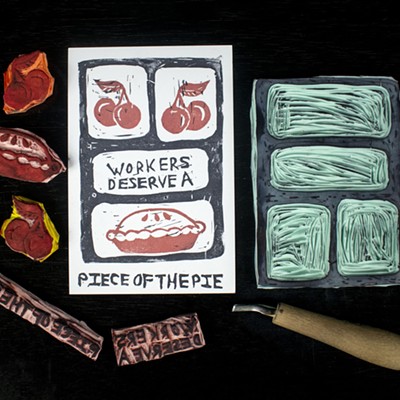Breaking into any music scene, to the uninitiated, is like inventing the wheel. Meeting people, finding gigs, booking studios and getting press takes a lot of time and energy, especially if a person is not familiar with the region. Luckily, Halifax is the hub of the Maritime scene, with a great music community and plenty of experienced musicians and industry professionals to gather information from.
Step one: Cram
Before hitting the stage, it’s imperative to take a crash course on the local scene. The clubs around town are a perfect place to start, but constant bar-hopping is a drain on the wallet (and the GPA). Cheaper and easier alternatives include record stores and music equipment retailers—they stock a large selection of Halifax music and are staffed by avid scenesters who know the skinny on who’s who in town—and organizations such as CKDU, Dalhousie’s radio station, and the Music Industry Association of Nova Scotia (MIANS), who avidly support the local music scene, are more than willing to help new people get their foot in the music industry’s door.
“The first thing I did when I moved to Halifax was dump my stuff in my dorm room and go to CKDU,” says experimental/techno expert Andrew Duke. “It gave me access to more gear, which spurred my transition to serious musician.”
Duke moved to the city from Great Village, Nova Scotia in 1987 to pursue a journalism degree at King’s, but quickly found his calling in audio manipulation and songwriting. Duke now runs his own electronic/experimental label, Cognition Audioworks, and is recognized worldwide as a tireless creator and promoter of electronic music.
“I basically got my start at CKDU and then met people at clubs and record stores,” says Duke. “When I started, e-mail and the Internet didn’t exist, so it’s a lot easier to get connected now.”
He’s right. Websites such as halifaxlocals.com, dependentmusic.com and 902 Hardcore (geocities.com/SunsetStrip/Birdland/9942/) are quick hook-ups to the heart of the Halifax music scene, with access to band websites, music forums and upcoming gig and musician information. Surfing the ’Net doesn’t compare to meeting people in person, though, so don’t spend every free moment jamming up message boards, no matter how much fun it seems at the time.
Step two: Play
“For me, busking and jams were the main way to meet people,” says 24-year-old blues man Charlie A’Court. These days, A’Court is a Halifax veteran with a full-length album, Colour Me Gone, and tours of the United States, Canada and Germany under his belt, but in 2000 he was just another struggling face in the crowd. A’Court established himself as a player by playing, gigging anywhere and everywhere.
“I was down on the waterfront and playing one day and the owner of Murphy’s on the Water was outside having lunch, and after he was done he came up to me and said, ‘Hey! I really I dig what you’re singing and I’m interested in having some music in the restaurant,’” says A’Court. “I ended up doing a five-week stint.”
For those who aren’t fortunate (or talented) enough to get plucked off the streets and thrust into paying bar gigs, there’s still hope. Open mics are a perfect opportunity to showcase for bar owners and gigging musicians, and with nine taking place over the course of any given week, it’s not hard to find a spot to play. The Thirsty Duck (5472 Spring Garden) opens its stage to the public Thursday. Bearly’s (1269 Barrington) and Rogues Roost (5435 Spring Garden) host jams on Sunday, while Ginger’s (1662 Barrington) takes a turn on Monday with its Stage Fright series.
The mother of all open mic nights, though, is Tuesday. The Danube (5680 Spring Garden), Khyber (1588 Barrington), Pógue Fadó (1581 Barrington), The Village Idiot (5680 Spring Garden) and Hell’s Kitchen (2037 Gottingen) each give would-be bands and solo artists a chance to strut their stuff in front of a live audience.
“It’s pretty receptive around here,” says guitar player Grizzly Babbins, who hosts the Hell’s Kitchen session with his rock band The Heelwalkers. “It’s a chance for bands to strut their stuff, but a lot of lone guitarists and drummers who are looking to join or form bands meet here too.”
Plenty of prominent Halifax bands and musicians started their careers on the open mic scene. Matt Mays, The Dean Malenkos and Blackout ’77 are just a few of the artists who made their way from the jam nights to big, paid stages.
“You have to get out and show your face to everybody, and stay on promoters, says Babbins. “If you keep in their face, they’ll give you a gig.”
Step three: Record
Once the shows start rolling in and a fanbase is under construction, the next inevitable step is recording some tunes. Home studios and computer programs cost as little as a couple hundred dollars (or free for software pirates) but if low-fi is not an option, the best bet is recording in a professional studio.
Choosing the best room for the job is an important first step.
“Look around and see where the stuff you like is coming from,” says Laurence Currie, owner of Idea of East Studios. “Check the studios out and find a place with a common view and focus.”
There are over a dozen recording studios in town, including Area 52 (2182 Gottingen), Ultramagnetic (1588 Barrington), Soundmarket (2159 Gottingen) and Sonic Temple (Hollis Street). Most rooms in the area run between $25 and $50 an hour, though, so being prepared before going in is a top priority.
“You should have your material 80 or 90 percent figured out before you go in,” says Currie, “The better you know your parts and their relationships with the other instruments, the quicker it is to record. Hopefully you’ll be inspired in the studio, but be prepared.”
Currie, who has recorded albums for Sloan, The Gandharvas, Jimmy Swift Band and King Konqueror, stresses that musicians need to know their gear as well as their tunes.
“If you go into the studio and your amp is fried, you can’t use it,” he says. “If your guitar neck is warped it won’t be in tune with the other instruments. Getting your gear checked out will save you hundreds of dollars in pain.”
Most importantly, says Currie, artists should go into the studio with a plan. “What’s your end goal? Is it just something you’re putting on cassette for bars or is it something you’re planning to sell and have on radio?” he asks. “Taking extra time and ramping it up to another level can help get press and gigs, and even jump-start a young, burgeoning career.”
Step four: Schmooze
Anyone who follows music in the media knows that good press can turn an ordinary career into an extraordinary one. Garage rock, Seattle, electroclash and even Halifax’s musical success were as much as much about media product as musical package. Yes, the music has to be good in order for it to get attention, but a little press can go a long way.
Putting together a decent press kit is a simple, effective way for artists to grab the media’s attention. A basic kit comprises of a demo or CD, a short bio, a decent 8x10 photo and contact information. As a career progresses, press clippings, reviews and quotes are usually included, but for a new artist, simple and concise is preferred to extensive and sloppy.
“Be creative and literate, make it entertaining and make sure it contains all of your pertinent information,” says former MuchMusic VJ Mike Campbell, who currently owns Boxcar Racer Entertainment. “And good spelling is important. If you can’t spell, I immediately think that the music can’t be good.”
Timing is also key. Playing a show might be a big step for a band, but with hundreds of gigs taking place in Halifax every week, it’s hardly newsworthy. Journalists are generally more interested in important showcases, tours, CD releases or quirky news bits that make a band stick out from the crowd.
And again, make sure the music is good. “Don’t suck, generally speaking,” says Campbell, laughing. “Don’t spend a lot of time whipping people into a lather without being ready for it.”
Step five: Tour
If everything goes as planned—the media falls in love, the shows are packed, the CD is selling and the music community is supportive, the last phase in a Halifamous career is leaving town. That doesn’t mean moving to Toronto (although it’s been known to happen), but spreading the love around the Maritimes. Sydney, Charlottetown, Moncton, Saint John and Fredericton are some of the region’s largest population centres and are less than six hours away, so weekend trips are easily arranged.
Good research skills and a good press kit—which should be developed by this point—really come in handy now. Booking out of town requires a bar owner or promoter to be able to envision what a band is all about without ever seeing the band live, so the better the information, the more likely a band will be booked. And researching each scene is important because decent venues are scant outside of Halifax. Figuring out which bars and promoters to contact before hand can save a band a lot of time and money.
“Try to make contact with a local band that plays a lot and talk to them about doing a show,” says Fabian O’Brien, guitarist for Dead Red. “Or if you’re sending press kits, make sure you have your shit together. It takes persistence and a bit of luck.”
O’Brien also points out bands have to pay their dues when entering unfamiliar territory. “You can be a headliner in Halifax, but if you go on a bill out of town you’ve got to open up, put on your best show and make people remember you,” he says. “Egos have to be checked at the city limits.”
And what type of money should a band expect to make their first time on tour? “Wads and wads of cash, thrown at you the moment you enter the city,” jokes O’Brien. “Be happy to cover gas money and get a few beers. Do it for the glory, it’s all part of the adventure.”
Originally published September 4, 2003.












